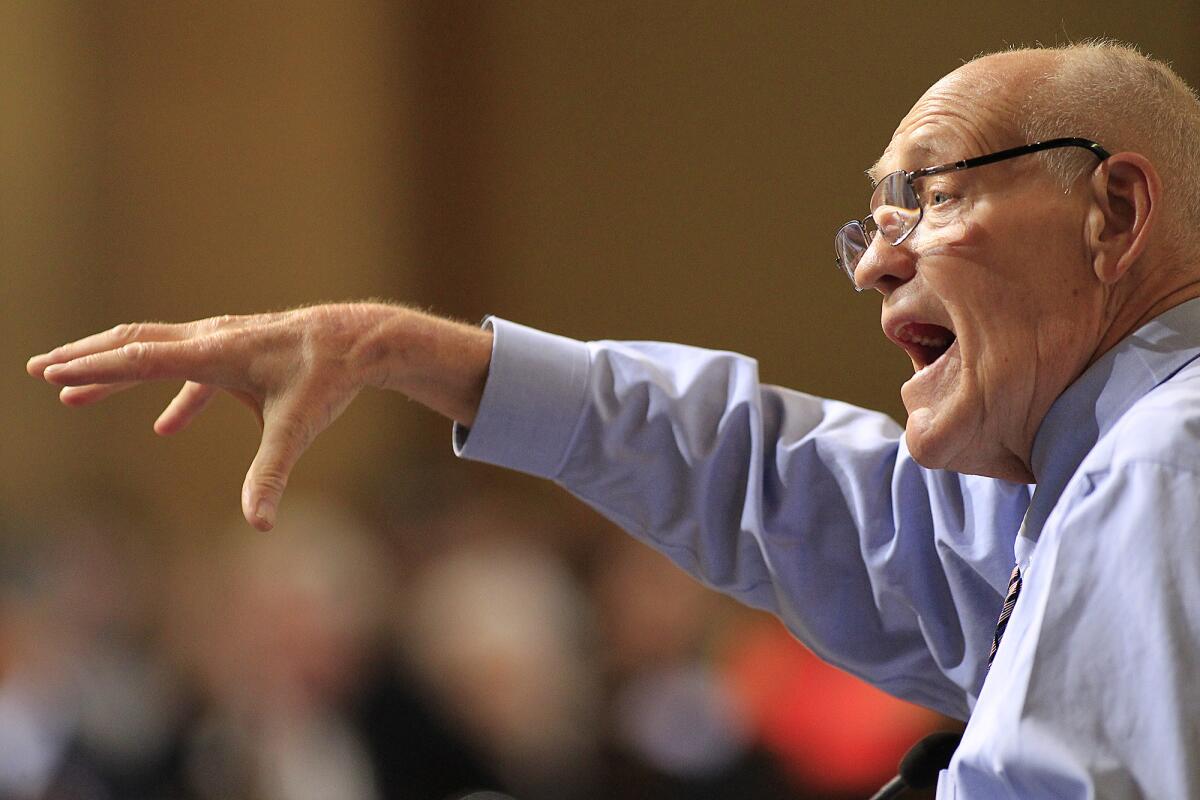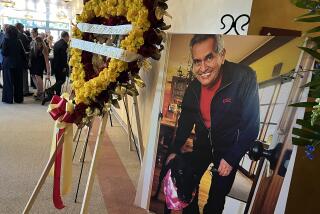Former Los Angeles City Councilman Bill Rosendahl dies at 70

Former Los Angeles City Councilman Bill Rosendahl died Wednesday morning after a battle with cancer.
All were welcome at Bill Rosendahl’s Mar Vista home, from elected leaders he befriended while serving on the Los Angeles City Council to sidewalk performers he met on Venice Beach.
It was there, at his Spanish-style bungalow that friends called a commune because of its many visitors, that Rosendahl retired to hospice in January after a four-year battle with cancer. And it was there that he died Wednesday at age 70, surrounded by friends and family.
The onetime television talk show host who became the first openly gay man to serve on the Los Angeles City Council is survived by his partner of many years, book publisher Hedi el Kholti.
A gregarious force at City Hall who advocated for the homeless, gays and lesbians and other liberal causes, Rosendahl in his later years became a vocal proponent of medical marijuana -- which he grew and used to help treat pain.
In the buttoned-up world of politics, he was an opinionated eccentric, once donning an Army hat in City Council chambers to denounce the wars in Iraq and Afghanistan. He was known around town for sharing cartons of eggs produced by his flock of backyard hens and for befriending people from all walks of life.
“He saw the absolute dignity in everybody, whether it was a billionaire that he represented in Brentwood or someone who was living on the streets,” said Mike Bonin, a city councilman who served eight years as Rosendahl’s chief of staff and who succeeded him after Rosendahl stepped down in 2013.
Elected in 2005 in a wealthy Westside district that stretches from Westchester to Pacific Palisades, Rosendahl was a lifelong Democrat who held his inauguration ceremony on the Venice Boardwalk -- with a rabbi, a priest and a shaman present. Guests were serenaded by the Venice Drum Circle.
Firmly anti-materialistic, Rosendahl often opened his home to down-on-their-luck strangers who needed a place to sleep. “I believe we’re just passing through,” he said in an interview in 2013. “By the time you die you should have nothing left.”
Rosendahl was diagnosed in 2012 with cancer of the ureter, the tube that connects the kidney to the bladder. The disease went into remission in 2013 but reappeared in 2014.
His death elicited outpourings from people of many stripes. Los Angeles Mayor Eric Garcetti, who served with Rosendahl on the City Council, called him a friend, mentor and “co-conspirator.”
“I loved talking to him about culture, travel and world affairs,” Garcetti said. “He knew everyone, had them on speed-dial, and used his network to help those who needed it most.”
Michael Weinstein, president of the AIDS Healthcare Foundation, an advocacy group where Rosendahl served as an advisor, praised him as “a prince of a man who gave voice to the voiceless.”
“Long before it was fashionable, Bill used the platform of his cable television news show to educate and inform the public about important, often unheralded causes that were near to his heart: the fight against HIV/AIDS, LGBT issues, the homeless and other disenfranchised communities,” Weinstein said.
Rosendahl became an AIDS advocate after his then-partner, Christopher Lee Blauman, died of complications from AIDS in 1995. Rosendahl planted a tree for Blauman in the frontyard of his house. It has since blossomed into a towering fir.
Born May 15, 1945, to German Catholic immigrants who fled Europe during Adolf Hitler’s rise to power, Rosendahl and his seven siblings grew up in Englewood, N.J.
As a teen, he became involved in the civil rights movement; he said he was on the Washington Mall in 1963 to hear the Rev. Martin Luther King Jr. deliver his “I Have a Dream” speech.
It was not the only time that Rosendahl would have a front-row seat to history.
An organizer on Robert F. Kennedy’s presidential campaign, he would later describe being at the Ambassador Hotel in Los Angeles in 1968 the night the candidate was assassinated. As a councilman, Rosendahl helped turn the hotel site into a public school complex named after Kennedy.
After a stint in the Army counseling soldiers returning from the Vietnam War and a job on George McGovern’s presidential campaign, Rosendahl took off for 18 months, traveling through Europe, the Middle East, Africa and South America.
Reflecting on that time, he said that he had been searching for something.
For years, Rosendahl quietly visited gay bars and introduced himself with a fake name. He said he was conflicted about his sexuality because of attitudes toward gays and lesbians in the Roman Catholic Church.
After his mother’s death in the 1970s, he came out to the rest of his family and moved to San Francisco, where the gay rights movement was gaining momentum. A few years later he moved to Los Angeles, settling in Venice Beach.
Rosendahl worked as an executive at several cable TV companies. Along with his managerial duties, he hosted a public affairs show that featured interviews with local and national politicians. In 2005, he decided to make his own run.
On the City Council, he opposed the large-scale expansion of Los Angeles International Airport and pushed for more public transit to ease traffic on congested Westside streets. He also spoke out on issues beyond the city, criticizing former President Clinton for not doing enough for gays and faulting President Obama for not ending all wars overseas.
Rosendahl opted not to run for a third term after his 2012 cancer diagnosis.
Even as he dealt with his own health, Rosendahl spent part of his final years providing hospice care for Swami X, an aging Venice Beach street performer he took into his home.
In recent months, after Rosendahl returned from the hospital and doctors said he could pass away any day, friends had been visiting his home regularly, holding something of “a living wake,” Bonin said.
“Bill loved that house. He loved the chirping of the finches and the ocean breeze,” Bonin said. “People would come and hold his hand, sing him a little song. It was a kind of loving farewell that most people don’t get to experience.”
Twitter: @katelinthicum
ALSO
Feminist, poet and a good neighbor: Spielberg, others, remember former USC President Steven Sample
L.A. City Council celebrates the earthquake lady on ‘Dr. Lucy Jones Day’
Treading a fine line, L.A. council considers ordinance to boost homeless sweeps
More to Read
Sign up for Essential California
The most important California stories and recommendations in your inbox every morning.
You may occasionally receive promotional content from the Los Angeles Times.











